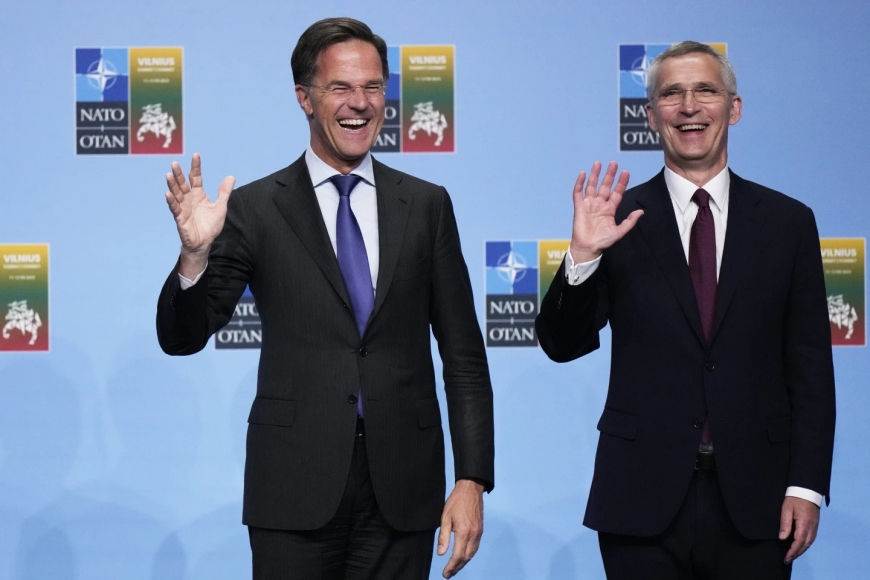Mark Rutte Named NATO Chief, Bringing Consensus-Building Expertise from Dutch Politics

Mark Rutte, who has spent over a dozen years at the helm of Dutch politics, is poised to bring his consensus-building skills to the international stage as NATO’s new secretary general. On Wednesday, NATO ambassadors appointed the outgoing Dutch prime minister to the alliance’s top civilian post, effective October.
Jens Stoltenberg, the outgoing NATO Secretary-General, lauded Rutte, calling him "a true trans-Atlanticist, a strong leader, and a consensus-builder." Stoltenberg expressed confidence in Rutte’s ability to strengthen NATO amidst current and future challenges, saying, "I know I am leaving NATO in good hands."
Rutte's nomination will be formally congratulated by President Joe Biden and other NATO leaders at a summit in Washington from July 9-11, which will focus on support for Ukraine against the Russian invasion—a significant test for the alliance.
Expressing his gratitude, Rutte called his nomination "a tremendous honor" on social media. "The alliance is and will remain the cornerstone of our collective security. Leading this organization is a responsibility I do not take lightly," he posted on X (formerly Twitter). He looks forward to assuming the position with "great vigor" in October.
The role of NATO secretary general involves chairing meetings, guiding delicate consultations among the 32 NATO member countries, ensuring decisions are implemented, and speaking on behalf of all members. Rutte’s appointment comes after significant diplomatic effort, including convincing skeptical leaders like Hungarian Prime Minister Viktor Orbán and Turkish President Recep Tayyip Erdogan to support his candidacy.
Rutte’s diplomatic acumen was crucial in securing the role. He had to negotiate Hungary’s exemption from providing personnel or funds for NATO’s new support plans for Ukraine. In an alliance that operates on consensus, every member has veto power, making such negotiations essential.
Former NATO spokesperson Oana Lungescu praised Rutte’s suitability for the role. "Like Stoltenberg, Rutte is a pragmatist and has developed good working relationships with both Joe Biden and Donald Trump. This could be a key asset for NATO after the November U.S. presidential election," Lungescu said. She described Rutte as "a safe pair of hands to lead NATO in turbulent times," reflecting on his adeptness in navigating political challenges.
Rutte’s journey to NATO chief follows a distinguished career in Dutch politics. A history graduate and former human resources manager at Unilever, he became Dutch prime minister in October 2010. He stepped down last July as his coalition grappled with migration issues.
Known for his down-to-earth demeanor, Rutte is often seen cycling around The Hague or walking to meetings while eating an apple. His approachable image is complemented by his robust support for Ukraine, having pledged military hardware including Leopard tanks and F-16 fighter jets to Kyiv during his tenure as prime minister.
Despite his successes, Rutte's political career has had its challenges. His third coalition government resigned in early 2021 over a scandal involving wrongful accusations of fraud in child welfare payments. However, Rutte led his party to victory in subsequent elections, forming his fourth coalition government.
Rutte’s extensive experience on the international stage, including strong relationships with leaders like former German chancellor Angela Merkel and France’s Emmanuel Macron, positions him well for his new role. "As a veteran of EU summits, Rutte will bring a different understanding of the complex NATO-EU relationship," Lungescu noted. "But he will also need to ensure that the EU’s defense efforts complement, rather than undermine NATO at this critical time."
Rutte's appointment marks a new chapter for NATO as it navigates the complexities of contemporary global security issues. His proven ability to build consensus and his experience in international diplomacy are expected to serve the alliance well in the years ahead.













































